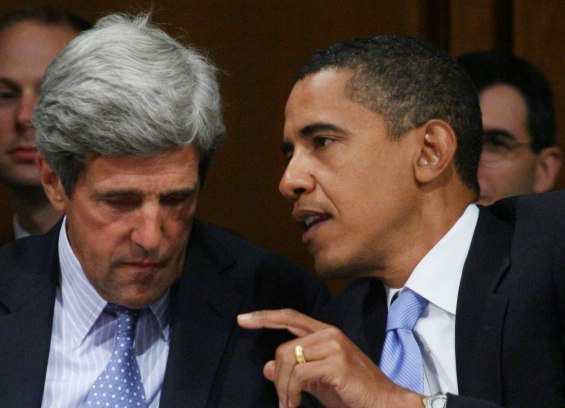Kerry at Foggy Bottom?
With Vietnam experience and foreign-policy expertise, the 2004 Democratic nominee would bring strong credentials to any possible Obama administration. His close ties to the Illinois senator, as well as his political skills, are assets. But will Biden stand for it?
Jul 31, 2020376 Shares187.7K Views
John Kerry was one of the first party leaders to endorse Barack Obama. (wdcpix)
Sen. John Kerry (D-Mass.), the Democratic nominee for president in 2004, has emerged as a leading candidate for secretary of state — should Sen. Barack Obama win the presidency Nov. 4.
Obama campaign advisers declined to comment on the record for this story. Nor would many Democratic foreign-policy experts who might join an Obama administration. But off the record, Obama aides made clear that Kerry’s name is on a very short list of contenders to become the country’s top diplomat. Another person talked up by the great mentioner is Sen. Chuck Hagel (R-Neb.), a Vietnam War veteran whose foreign-policy views align surprisingly well with Obama’s.
Kerry would bring strong credentials to an Obama administration. His Vietnam experience instilled in him a sense of the tragic and a gravity about committing U.S. forces to peripheral conflicts. He has a well-established place in the Senate as a foreign-policy expert, stemming from his seat on the Foreign Relations Committee. His first book, “The New War,” published in 1998, was a prescient look at threats to national security from non-state actors like terrorists and narco-traffickers.
Illustration by: Matt Mahurin
Furthermore, longtime observers say, Kerry’s political instincts could be an asset. Joseph Cirincione, president of the Ploughshares Fund, a grant-making foundation for non-proliferation studies, said Kerry’s experience in the Senate — and as a presidential nominee — taught him the importance of building domestic support for an administration’s foreign policy. “He combines foreign-policy expertise with political instincts,” Cirincione said. “He understands it’s not enough to have the right policy, but to deliver the policy and build support for that policy.”
Over this year, Kerry has developed a close relationship with Obama. In January, he lent high-profile support to the Illinois senator in the Democratic primary, endorsing him immediately after Obama’s victory in the Iowa caucuses. At a time when many leading party figures were still withholding endorsements, Kerry intended his support to help Obama win the New Hampshire primary and end Sen. Hillary Rodham Clinton’s (D-N.Y.) front-runner bid for the nomination.
While that didn’t happen, Kerry still remained active as an Obama surrogate on the campaign trail. Aides who do not wish to be quoted said that Kerry often implored Obama to draw sharp distinctions with Sen. John McCain (R-Ariz.) on foreign policy — a lesson perhaps born of Kerry’s own reluctance in 2004 to renounce the invasion of Iraq.
“John Kerry has consistently pursued liberal internationalist positions in the Senate, which are in accord with expectations about an Obama administration foreign policy,” said Robert Farley, a national-security professor at the University of Kentucky’s Patterson School of Diplomacy and International Commerce, in an email. “Notably, Sen. Kerry spearheaded initiatives to engage with two nations viewed as hostile to the United States. In 1985, Kerry visited Nicaragua and met with President [Daniel] Ortega, then under heavy pressure from the United States and its Contra proxies. In the early 1990s, Kerry (along with Sen. John McCain) worked to lay the ground for normalization of relations with Vietnam, including hearings that put to rest the idea that Vietnam continued to hold U.S. POWs. To the extent that a President Obama would seek engagement with Iran, North Korea or other nations hostile to the United States, Kerry would seem an ideal choice for secretary of state.”
During the Democratic National Convention in Denver, Kerry gave one of the most forceful speeches, directly attacking McCain on his perceived foreign-policy strengths. “When John McCain stood on the deck of an aircraft carrier just three months after 9/11 and proclaimed, ‘Next up, Baghdad!’” Kerry said, “Barack Obama saw, even then, an occupation of ‘undetermined length, undetermined cost, undetermined consequences’ that would ‘only fan the flames of the Middle East.’ Well, guess what? Mission accomplished.”
Kerry, of course, famously offered McCain a place on the 2004 Democratic ticket.
Since losing the presidency in 2004, Kerry’s foreign-policy positions have assumed a bolder cast. He repudiated the Iraq war in 2005; opposed President George W. Bush’s 2007 troop surge with vigor and set to work overturning the media caricature of him as a politician without convictions.
In an off-the-cuff talkin Denver just before his convention speech, Kerry argued for vigorous U.S. re-engagement to broker an Israeli-Palestinian peace; an end to the Iraq war that includes a negotiated reconciliation between Sunnis and Shiites; and reframing the war on terrorism as a “global counterinsurgency” requiring a fundamental “rethink” of U.S. strategy. In a July Op-Ed for the Financial Times, the Massachusetts senator arguedfor making “a nuclear-free world” a central goal of U.S. foreign policy.
“Kerry would be a great secretary of state,” said Cirincione. “One of the best things that ever happened to him was to realize he’s not going to be president. It freed him up, and let Kerry be Kerry. His insights and statements over the last couple of years are some of the best work he’s ever done.”
Bob Mackey, a recently-retired Army officer, agreed. “Given his views on Iraq and the war on terror, [Kerry] would be of substantial benefit to the U.S. image overseas,” Mackey said. “Few, if any, senior leaders in the U.S. would do a better job. Many would do a lot worse.”
Rachel Kleinfeld, executive director of the Truman National Security Project, an organization advising progressive candidates on foreign policy, called Kerry’s foreign-policy instincts “excellent” but pointed out that a successful secretary of state had to be “someone close enough to Sen. Obama to make that department stronger.”
Advisers caution that Kerry isn’t a certainty to be Obama’s pick for Foggy Bottom. For one thing, his skill set as a senator with extensive foreign-policy experience and a perch on the Foreign Relations Committee matches that of Joe Biden, the vice-presidential nominee. For another, Kerry is running for his fifth term in the Senate, and if Biden wins the vice-presidency, the chairmanship of the Senate Foreign Relations Committee will be open.
In addition, other members on the short list for secretary of state offer their own strengths: Hagel, for one, would allow Obama a high-profile gesture to moderate Republicans.
Aides to Kerry did not return requests for comment. Similarly, many Democratic foreign-policy hands were reluctant to comment for publication. “People don’t want to do anything to hurt their chances of getting an appointment,” Cirincione observed. “This is Washington, man, everybody except for maybe four or five people wants to go into the administration. And I’m one of them — so I’m talking to you.”

Hajra Shannon
Reviewer
Latest Articles
Popular Articles

